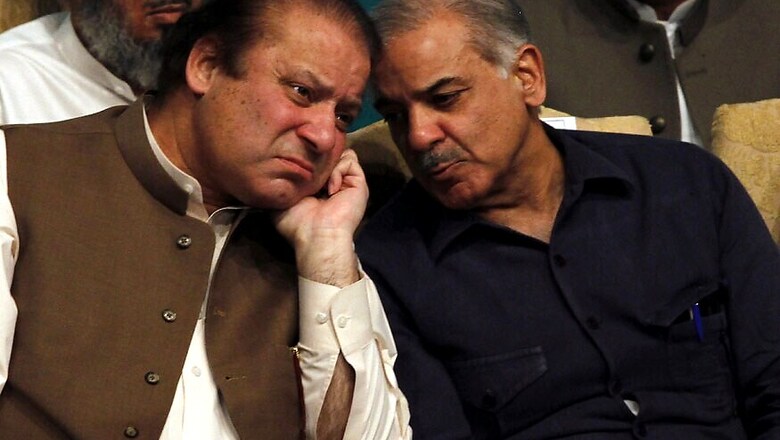
views
New Delhi/Islamabad: Nawaz Sharif's younger brother Shehbaz Sharif is likely to be the next prime minister of Pakistan, reports in Pakistan media said on Friday.
A unanimous verdict by five Supreme Court judges disqualified Nawaz Sharif, saying that he had been dishonest to the Parliament and the courts and could not be deemed fit for office. Sharif stepped down from his post soon after the verdict.
The court also ordered a criminal probe into the Sharif family over allegations stemming from the "Panama Papers" leaks of international offshore companies.
Sharif's ruling Pakistan Muslim League-Nawaz (PML-N) party, which holds a solid majority in the Parliament, is expected to name a new prime minister to hold office until elections due next year. Sharif would have been the first Pakistani premier to complete a full five-year term.
Currently, the frontrunner to be a possible replacement of Sharif is his influential brother Shehbaz, who is the current chief minister of Punjab province. The 51-year-old has held the post since June 2008.
A strong political leader known for his efficient administration, Shehbaz has been instrumental in bring in health and education reforms in Punjab province. A veteran leader, he had first become the CM in 1997, but a military coup toppled his, and the federal government, in 1999. He spent years in exile, mostly in Saudi Arabia. He returned to Pakistan and again became the CM in 2008. He is currently serving his second term.
A hurdle in his appointment is that he would first have to step down as CM of Punjab and win a by-election for an open parliamentary seat, which would take at least 45 days.
Other names being discussed to replace Sharif in the short term are members of his outgoing cabinet, including Defence Minister Asif Khawaja, Planning Minister Ahsan Iqbal and Petroleum Minister Shahid Abbasi.
Whoever replaces Sharif will have to tackle Pakistan's frayed relations with India, worsening ties with the United States and persistent attacks by Islamist militants, including the Pakistani Taliban and Islamic State.
As the verdict was announced in Islamabad, opposition supporters rushed into the street chanting slogans and handing out sweets in celebration. At the heart of the case was the legitimacy of the funds used by the Sharif family to purchase several high-end London properties via offshore companies.
The Supreme Court had in April declared there was "insufficient evidence" to oust Sharif over the allegations, and had formed a Joint Investigation Team for a through probe. Its findings, including previously undisclosed links between Sharif and companies in the UAE, sparked an uproar, with the scandal playing out on the country's frenetic news channels.
Sharif has been ousted by corruption allegations once before, when he was sacked by the country's then-president during his first term in 1993. He was removed from office in his second term by a military coup in 1999.
Sharif's ousting comes as the civilian government appears to have reached an uneasy detente with the military, which has ruled Pakistan for half of its existence.
The ousted PM has not spoken in public since the court ruling, but his railways minister, Khawaja Saad Rafiq, implied that the elements of the military were in some way involved.
“We know very well what the crime of Nawaz Sharif and the Muslim League is. What do we ask for? We ask for civilian supremacy in Pakistan,” Rafiq said. When questioned further, however, he refused to name the military as a whole. “We have already said that no institution of Pakistan is involved any conspiracy,” he said.
Pakistan's military has denied any involvement in the legal case and did not respond to requests for official comment on Friday. Khan's party has said the ruling party often blames the military to deflect from its own failings.



















Comments
0 comment